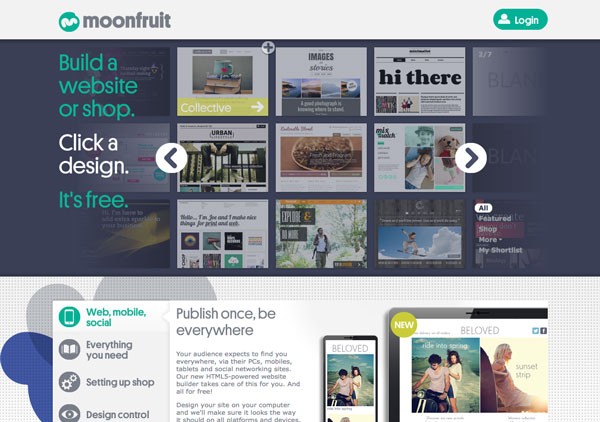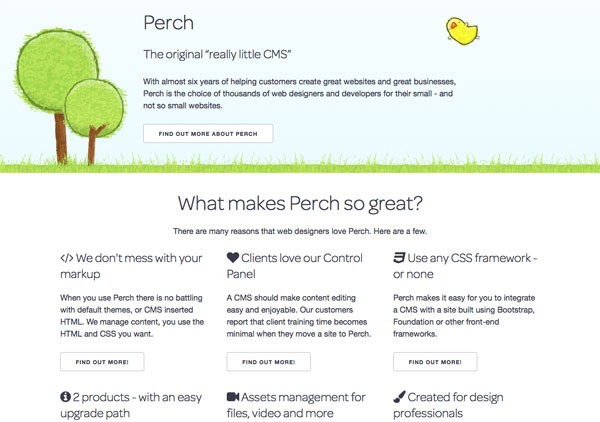If you're anything like me, every time a new website builder or CMS is launched (at least a good one), a little part of you goes cold.
As someone who's made a living for a few years developing sites for small businesses, I see these tools that businesses can use to create their own site as a big part of the competition. As the available tools improve in quality and get easier to use, they eat further into the market for the sort of simple business website design that's long been bread and butter work for many small web agencies.
The availability of tools like these, and the growth in in-house skills for simple web development work, has had an impact on the market for simple website design and development. And what's worse, the fact that these tools can be very cheap (or even free) means that clients are increasingly keen to negotiate down on price.
You may be tempted to hold your head in your hands in despair: after all, I'm not painting a very rosy picture (sorry!). But the good news is that if you're prepared to adapt to the changing landscape, there are strategies you can adopt that will ensure you still have a market for your skills as a web designer or developer.
In this article I'll look at each of these in turn. They are: innovation, specialization and willingness to continuously adapt and improve.
But first, let's take a look at what's going on out there.
The Changing Landscape
When I first started doing client work, there weren't a lot of website builders that potential clients could use instead of hiring an agency to build their site for them. At least, there certainly weren't very many good ones. I was all too aware of the bad ones: I was taking on a lot of clients who'd created a site with the freebie site creator bundled with their hosting package, hated it and wanted a professional to create something better for them.
But things have changed. Small businesses or nonprofit organisations often have limited budgets and the motivation to learn some basic web design skills and devote hours of their time to creating a website. Using a free (or cheap) online tool can be very tempting when compared to paying hundreds or thousands of dollars for a professional agency.
Let's take a look at some of these tools. First, there are the big website creation tools:
- Squarespace starts form just £8 a month and offers designs tailored for different markets, plus stock images, e-commerce and mobile apps.
- Wordpress.com has an amazing 50,000 new sites started on it every day. A high proportion of those don't last more than a few hours or days and most are blogs, but more and more businesses and nonprofits are using the platform to host their site.
- Wix lets you start with a free plan and has over 65 million users. It includes templates for different markets, SEO and e-commerce with paid plans.
- Weebly also starts at free and includes hundreds of themes, with an easy to use front-end editing and design tool.
- Moonfruit has hundreds of templates, starts with a free plan including e-commerce and focuses on integrating social and mobile with your website.

As well as these, potential clients can choose to use a CMS without the input of a developer:
- Wordpress.org claims to be easy to install with the 'famous five minute install' and is completely free to use. With frameworks and theme vendors offering a myriad of themes designed for specific audiences, this makes things even easier for users. The latest major release of WordPress had over 17 million downloads—they certainty weren't all developers!
- Perch sets itself apart by being small and avoiding the bloat of some of the big CMSes. It doesn't have a free plan but only charges you once for each site, with the per-site cost as low as £50.
-
Cushy CMS starts with a free plan including one site, although for more customisation options people will need to pay $28 per month.
- Installers like Softaculous and Fantastico, bundled with cPanel on many hosting packages, let users install a variety of CMSes and website creation tools without having to go through manual installation. For people wanting to use WordPress, for example, this can make things really easy and free.

These tools are a completely different project to most of what was available five years ago: they're modern, user-friendly systems that let businesses and nonprofits create a professional looking website at a fraction of the cost of hiring a professional. And this is by no means a definitive list.
So with all this competition for the lowest hanging fruit (the simple business or nonprofit website), it's no longer a long term proposition to target this market as a professional web developer or agency. Instead you need to differentiate yourself from solutions like this which, although they're great tools for millions of people, will never be enough for everyone.
So let's start by taking a look at one of the ways you can differentiate yourself: through specialisation.
Specialize to Differentiate Yourself
Most of the successful web developers and designers I know have chosen to specialize in an area of development, a language or technology, or a target market.
A lot of people have fallen into this specialization because of the kind of clients they've found themselves working with, but many more have actively chosen to specialize.
Specialization can mean one of a a few things. You can choose to target a specific market, you can focus on becoming an expert on a specific language or technology, or you can provide a specific kind of service to clients.
Focusing on One Technology or Language
How specialized you can afford to be in this area will depend on how big your operation is: if you run an agency employing 50 people, you can hardly afford to focus completely on JavaScript for example, but if you're a lone freelancer you certainly can.
However if you're pitching for work on behalf of a large team you can certainly afford to specialize in a technology such as app development or a tool such as a given content management system, for example. Just google 'WordPress agency' and you'll see what I mean!
Targeting a Niche Market
Another option is to identify a market to work with exclusively, or maybe to focus on. This could be a broad sector such as nonprofits or a more defined niche such as the beauty industry.
By working with a target market, you can build a reputation within that group of clients which will travel around the industry and you could find yourself getting word of mouth work as clients recommend you to their contacts. Alternatively, focusing your SEO on a specific market will help you when those businesses or organisations are looking for someone to give their custom work to.
It also means you get to know the industry well and so can provide a more tailored service, with an input that goes well beyond simply providing a website and encompasses marketing and business development using the Internet.
Providing a Specific Service
Another route you could go down is to work with a variety of types of clients but provide a very focused service or product to them. For example you could specialize in e-commerce, online marketing or social media provision. You could use a variety of technologies to do this work (you might choose to use different e-commerce solutions based on client need and budget, for example), but the service you provide is essentially the same.
This means you get to know the activity you offer inside out and can offer high quality support to your clients over and above anything a generalist or online tool might be able to give them.

10 Degrees is a UK based agency that has chosen to specialise in offering e-commerce sites using WordPress and WooCommerce. Its founder Jonny Vaughan told me, "We chose to specialise as it focuses our skills. This lets us deliver better value to our clients because we have more knowledge of the product than other agencies. It also reduces competition since we’re more unique than general web development agencies and it helps our marketing." A client can always create their own store using Shopify, Magento or WooCommerce, but they won't know how to optimize that store for the highest rate of conversions: as an e-commerce expert, you will.
Attract Clients Through Innovation
If you've got a reputation as a truly innovative developer or agency, as someone whose work makes people sit up and take notice and who's ahead of the game, then you'll attract the clients wanting an edge that online tools just can't give them.
Being innovative comes more easily to some than to others but it can simply mean being slightly ahead of the industry trends. For example, four years ago responsive design was new: it wasn't mainstream like it is today. Being able to create responsive sites wasn't innovative for me (I wasn't Ethan Marcotte, after all), but being an expert in creating responsive sites with WordPress was. I built myself a reputation as a leading expert in responsive WordPress development in the UK, blogged on the subject and had a book published on it. As a result, clients came to me who wanted the latest hot thing in web design: a responsive theme for their site.
If you can identify trends in web development very early, before they're adopted by the competition or by the big online tools, then you'll have something to offer potential clients that they can't get elsewhere.
Or if your design work is simply cutting edge and wins awards, then that will work too!
Continuously Adapting
There is bad news, I'm afraid. Having identified your strategy for staying ahead of the completion, you won't be able to stick with it for long.
The Internet, and the needs of clients, are constantly evolving. And those developers, designers and agencies who continuously improve and adapt will be the most successful.
I've already provided an example from my own experience of how I specialized in responsive design to differentiate myself. I no longer do that. I still design responsive websites, sure, but I don't use that to market myself. Any web developer or agency worth their salt is creating responsive sites these days and it just doesn't differentiate me from the competition anymore.
As trends evolve and client needs move on, you need to keep abreast of developments and either get better at what you already do or change to doing something slightly or even wildly different.

Kirsty Burgoine is a freelance developer and runs the R(E)evolution web design conference. She told me:
The internet moves so quickly now that I think you have to not only be willing to, but want to continually learn new things to stay current. I do that by reading blogs, attending meetups and conferences, talking with colleagues and peers and generally just trying out new tools and technologies. It's also worth considering where your passion and enthusiasm lies. No one is a master of all trades so specializing in the work you genuinely love will go a long way to helping you stay ahead of the game.
This means you won't find yourself stuck in five year's time offering a set of services that people simply don't want anymore.
But how do you adapt? Here are my tips:
- Keep abreast of developments in the industry: subscribe to sites like this one and others relevant to your niche.
- If you're working with a niche market, keep abreast of developments in their industry so you can adapt your offering to meet their changing needs.
- If you work with a specific tool or technology, continuously develop your skills with that tool and make sure that if the way it's used changes, you change with it. For example, WordPress developers would be wise right now to move their focus away from PHP to some extent and towards JavaScript, with the advent of the WP-REST API.
- Go to conferences and networking events so you can find out what people are talking about, what's new and what clients want. These will include events for the web industry and for your clients' industry.
- Be flexible. Don't assume that the strategy you're using now will work in the future. If your innovation gets you work now, it may be that specialisation gets you work in the future.
- Move outside your comfort zone. Learn new skills and avoid getting stuck in a rut.
Summary
The market for web development and design skills and services has moved on massively from where it was five years ago when I started working with clients, and the pace of change is constantly accelerating. The advent of new hardware and software, the rise of cheap but good quality tools, developments in web standards and the use of languages and technologies, as well as the changing needs and expectations of clients all contribute to making it ever harder to compete.
But if you're clever, you can stay ahead of the curve. As I hope I've demonstrated in this article, there are a variety of options available to you which will help you differentiate your offering. If you use one or more of these to stand out, then the clients should be beating down your door.
Resources
Graphic Credit: Aartiraghu icon designed by Running from the Noun Project.


Comments